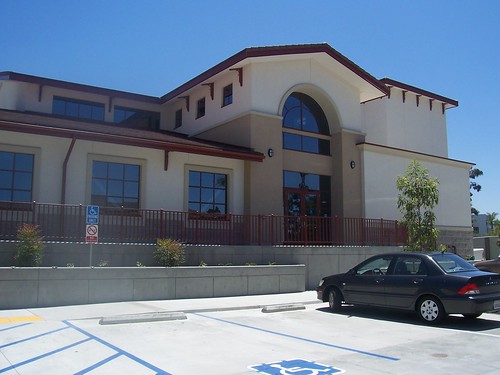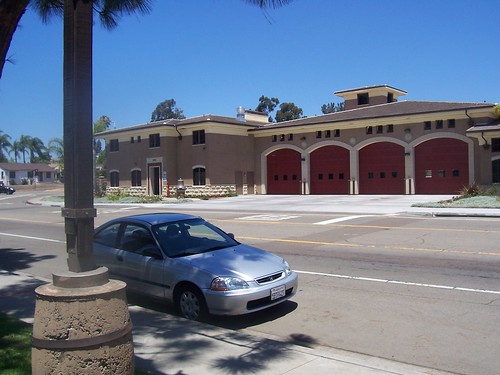Dan Melson: July 2008 Archives
This is third installment of a new series I'm starting, on the neighborhoods of the area I primarily work, which includes La Mesa, San Carlos, El Cajon and Santee.
This area is bounded by Massachusetts Avenue on the east, California 94 on the south, the San Diego City Limits on the west, and University Avenue on the north. The area in San Diego west almost to College Avenue is broadly similar. The area in La Mesa east across Massachusetts (Lemon Grove Vista) is perhaps slightly less desirable. The main "neighborhood" streets are Waite and Hoffman (which becomes Celia Vista at the San Diego City Limits). Lois and King streets, which are essentially extensions of 70th Street, are used to a lesser extent. Marian has a light on University it shares with Harbinson on the other side of that street, but is very quiet once you get south of Boulevard Place (a short frontage road for University).
Two views of the intersection of King and Hoffman. First, looking north:

Keep in mind, this is the busiest corner inside the neighborhood, excepting only the commercial arteries on the edge!
The main commercial arteries serving the area are University Avenue and Massachusetts Avenue. At one point in the distant past, there was a mini-mart on Hoffman but it's long since been converted to a residence. The area was mostly built up in the 1920s through the 1940s, and has been stable or slightly improving since the late 1970s.
University Avenue looking west from 70th/Lois. Center of the picture is Joan Kroc Community Center, which has everything from gym to swim to daycare to rec classes to religious meetings

Massachusetts from Waite drive, looking north:

This was during the lunch hour rush. There's a freeway onramp just the other side of where I was standing. As you can see, it's not too bad. Just the other side of the freeway is a large neighborhood shopping center, including an In & Out Burger, if you're one of their many fans.
Physically, the houses are mostly smaller, with a good sprinkling of what were originally two bedroom cottages of about 800 -900 square feet, but most of the neighborhood is three bedrooms now with maybe 20% being four. Most properties have garages, split about half and half between the one and two car variety. Far more use piers than concrete foundations. Large numbers have been modernized, but hardwood floors are still more the rule than the exception. The lots are typically 6500 square feet up to about 9000 or thereabouts, so they originally had plenty of room for additions, and perhaps half have had at least one extra bedroom or bathroom added, most of these before permits were required and therefore grandfathered in. Architecturally, Craftsman style is quite common, but pretty much every house is different from every other, and there's only one small cookie cutter development of about a dozen dwellings in a PUD that was built maybe fifteen years ago as a fill-in. Foundation issues and destructive settling aren't unknown, but most of those issues have long since been dealt with. Mature trees are perhaps less common than some other areas of La Mesa, but there's no shortage of them here.
Once you get away from the main commercial streets, this is a nice quiet neighborhood. At least one resident kept a couple of horses as of a couple weeks ago. The corridor between Boulevard Place and University is noisy and busy, as is the stuff right on Massachusetts Avenue, but once you get onto the neighborhood streets, traffic is sparse and about the only high density housing I can think of is on Waite Drive between King and Massachusetts. By and large, it's all single family detached housing.
Once per month, I invite other real estate websites to submit one article, written for consumers on some subject of real estate. I ruthlessly reject wrong, bad, and useless information, and actually make fun of all the spam (without linking, so they don't get their search engine kick).
Today, the Consumer Focused Carnival of Real Estate for July is up. It's kind of small - not surprising in the summer. But it does show that I'm not the only one writing for consumers.
The Carnival will return on August 31, 2008. If you would like to submit, the guidelines are here, and the link is here, or you can just email me (A valid email return address is required in any case). Ideally, I'd like to start getting enough submissions to justify doing the carnival more often.
Today's new consumer article is Desperation Mining: How a Buyer Hits Paydirt (and How Sellers Can Avoid it), which talks about the anatomy of a successful low-ball, both from the seller's perspective and the buyer's.
There is still an extremely lucrative but shrinking pool of such properties in the current market, especially if you're not intending to immediately flip the property. However, inventory is shrinking, and it's going to become a lot harder to find such properties once people figure out that we have hit bottom already here in San Diego.
Today's new consumer article is Conforming and Jumbo Only Apply to "A Paper" Conventional Financing, a discussion of the root differences between A paper, government loans, and subprime.
This is a new series I'm starting, on the neighborhoods of the area I primarily work, which includes La Mesa, San Carlos, El Cajon and Santee.
La Mesa Village is the old downtown area of La Mesa. This was the central area when La Mesa was still a farming and ranching town before World War I. Most of the city offices are in this area, and some of the buildings date back back to the 1890s or further - quite old for California. In recent years, it has seen a renewal as the city made an effort to make into a destination and gathering place. Many of the civic buildings have been rebuilt completely very recently, and There's always been an Oktoberfest here, but in the last few years it has gotten much bigger than formerly, and many other activities have been added. For instance, on Thursday evenings there's a classic car show, centered on La Mesa Boulevard west of Spring Street. Studios and small personal businesses abound in the commercial areas. This area is bounded by University Avenue at the western intersection with La Mesa Boulevard (they intersect twice) to Memorial Park and the eastern intersection, up to Lemon Avenue to Fourth over to Pasadena across Spring Street (even though it doesn't actually cross Spring) , and up Date Avenue to Acacia Avenue and thence back down the hill, including Alta and more of Lemon Avenue.
City Hall, one of the few buildings that hasn't been replaced

The main commercial arteries serving the area are Spring Street running north--south, and University Avenue, La Mesa Boulevard, and Allison Avenue running East West. El Cajon Boulevard does not actually the enter the area although it's only a block or so away. There's a couple blocks of small businesses on Lemon and Palm Avenues as well.
Here's a view that probably represents the Village commercial area at least as well as any, looking West on La Mesa Boulevard from Fourth
Here's the La Mesa Boulevard Trolley Stop, one of the big things the City of La Mesa has done right, enabling the Village to be a center for public activity without becoming a complete parking nightmare:

(The Spring Street stop, roughly a quarter mile away, has a good size public parking lot. A lot of La Mesans use it to commute to downtown San Diego)
The Railway Museum across the street (open from 1-4 on Saturdays):

The Old San Diego and Arizona Eastern Railway tracks support the Trolley for a good portion of its length. The original is well known in railroading circles for Carrizo Gorge Railway. I remember the trains coming through before the tracks were washed out there in the early 1970s.
One of the things that stand out about the area, however, is how quickly it changes from commercial to residential, and how quiet those residential areas are by comparison. It's a three minute walk from a lot of good residential areas to the commercial heart of the village. The whole area is very walkable. This is largely because it grew that way organically - this is a very difficult thing to plan, especially in today's urban landscapes. For instance, here's a picture of Palm Avenue itself, between Alison and University. One block over, Palm turns commercial, and University and Allison are both commercial, but this is a quiet residential street. I took this from the corner at University.
Several blocks to the south, this is the steeple of the Methodist Church, just south of Lemon, where Palm starts turning residential again:
 .
.
The area south along Palm south of Lemon is probably the oldest and least expensive housing in the area. I prefer to avoid it with my clients, but even so there are some gems, like this place that sold about a month ago:
There are some decidedly pricier areas in the Village area as well. Here's a viewpoint from the middle of Date Avenue
And from the top of Date Avenue:

The Rock House slightly left of center behind the trees is historical, and I can remember when there were only a couple houses on this segment of Date
A small distance away, here's a view from near the top of Acacia:

And a little bit further down Acacia:

As you can see, lots of trees and good views. I used to have a wonderful old lady on my paper route growing up, who originally owned a lot of this area, and remembered when La Mesa ran that moving picture riff-raff out of town before World War I (briefly mentioned in Nickelodeon)
Physically, the houses are mostly three to four bedroom, one to two bathroom houses, built between 1910 and the early 1950s. More of them use piers than concrete foundations, and the architectural styles vary from Edwardian to modern. Hardwood floors are far more the rule than the exception. There is a lot of individual character to most of the houses, with only one small cookie cutter development I can think of. Most of the residents love it. There are some more modern dwellings built as fill-ins and replacements. Asking prices vary from around $350,000 to $700,000 as of this writing, with the higher value residences mostly being on and around Date and Acacia, and the lower end on Palm and the bottom of Nebo, and the rest of the area falling in-between, including the residential areas around the east end of University Avenue such as Pine and Colina, as well. Foundation and settling issues have always been rare in the area, and have mostly long since been dealt with.
There are comparatively few high density projects, with the area immediately adjacent to Spring Street south of Lemon being the exception. There is a high rise condominium project and senior housing on what's left of Orange Avenue behind the shopping center, between Acacia and Date, both 1980s vintage on the remaining land from the former site of La Mesa Elementary (I was a member of the last graduating class), which along with the former Helix Theater and quite a bit of other stuff, had previously been used for La Mesa Springs Shopping Center
Here' the San Diego Culinary Institute on the south end of the shopping center, where they really do train a lot of high end cooks:

Henry's on Spring Street is for lovers of great fruits and vegetables

The neighborhood schools are Lemon Avenue, and La Mesa Dale, with Spring Street being the approximate dividing line. The Middle School is La Mesa Middle School (formerly La Mesa Junior High), and the high school is Helix Charter. Helix, in particular, has a long record of academic achievement. Here's the most recent account Helix Accountability Report Card
The closest community college is Grossmont, the closest four year college is San Diego State University, which is actually closer.
The Village is not the very best neighborhood of La Mesa, but most of it is pretty darned nice. It's a great place to be, and you don't have to go very far to find interesting things to do.
The Municipal pool at the end of Memorial Drive: (There's a nine hole golf course adjacent)

Nan Couts Park, between Nan Couts Cottage and the Community Center (also on Memorial Drive):
 .
.
Memorial Field, where La Mesa National Little League plays, as well as various recreation leagues:

Transportation and the roads serving the area about as good as it gets. Spring Street runs between I-8 and the Junction of California 94 and 125. There are also other freeway entrances and exits close by. The Trolley runs along Spring Street, with previously mentioned stops, and several bus routes feed it as well. You can get to Mission Valley shopping and commercial zone in about ten minutes, Downtown San Diego in about fifteen. Even during rush hour, traffic is nothing as compared to what the commuters on I-15 and I-5 face constantly. Local major shopping includes Grossmort Center (Target, Wal-Mart, Macy's, Theaters), a five minute or less drive that's also served by the Trolley, or you can bike on over via several good routes. There's a Costco even closer on Fletcher Parkway. College Grove (Sam's Club and Penneys) is almost as easy, and Parkway Plaza in El Cajon is also a good option.
If you'd like to talk more about The Village or any other neighborhood of La Mesa, Contact me. I will be happy to discuss which neighborhoods might be right for you, or the marketing of your current property.
Newly Written Articles
Buying Teardown Properties and Condemned Buildings, which talks about some of the issues if you buy a property with intent to demolish and rebuild.
What Does It Mean To Fall Out Of Escrow?, demystifying the process a bit and showing that it's not the escrow process that's to blame.
Procuring Cause and Multiple Agents Talks about how to handle which agent gets credit. It's pretty easy. Not quite as easy as falling out of bed, but close.
Updated Articles
Pre-Payment Penalties and Second Trust Deeds discusses interactions between first and second mortgages, and how a first can tie your hands on a second, or vice versa.
For Sale By Owner - Working Directly With a Loan Officer There is no legal requirement to work with a real estate agent. You're being penny wise and pound foolish if you do - but that's your right.
Demands Listing Agents Make That Aren't in Their Clients Best Interest, discussing ways that agents hose their clients because it makes more money for them, or just makes it easier.
Stand Alone versus Piggyback Second Trust Deeds, a discussions of the merits of each and current alternatives
This is a new series I'm starting, on the neighborhoods of the area I primarily work, which includes La Mesa, San Carlos, El Cajon and Santee.
This area is bounded by 70th street, University Avenue, the San Diego border (which is highly irregular) and El Cajon Boulevard. On the San Diego side of the border, the neighborhood is similar until you get west of Aragon Drive and Rolando Boulevard. North of El Cajon Boulevard is all San Diego, and is also similar. East of 70th Street is a slightly older area of La Mesa with fewer trees centered upon Harbison Drive. South of University Avenue is Vista La Mesa.
The main commercial arteries serving the area are El Cajon Boulevard and University Avenue, there being no commercial activity on 70th Street away from the two main intersections.
Here is a photograph of University Avenue, as seen westbound from 70th. Joan Kroc Community Center occupies the center of the photo on the far side of University Avenue. They have everything from recreation classes to religious meetings to community programs and daycare. (click for whole picture)
Best Produce sits just out of the previous photo to the left, on the southwest corner of the intersection of 70th and University. If you want real fresh produce, you have the choice of them or Henry's on Spring Street.
The actual La Mesa area of Rolando is fairly small, but it shares character with the San Diego side. The neighborhood is mature, with a very large number of trees, as you will see, for instance. The main "neighborhood street" is Tower Street, on which sits Rolando School. (Tower changes its name to Solita at the San Diego border). (click for whole picture)
Once you're away from the main arteries, there really isn't much in the way of high density housing. Most of the neighborhood is single family residences, built during the 1950s if not before. The subdivision maps were laid out in the early 1900s, but not filled in until the post-war period. Any housing built since about 1960 is mostly replacement for an earlier original. The vast majority of houses are unique - I cannot think of a single tract development in the entire area. Every house is different from every other. This characteristic is pretty common in La Mesa, something most of the residents love.
Physically, the houses are mostly single story 3 and 4 bedroom, 1.5 to 2 bath houses from around 1200 square feet to around 1600, sitting on lots of about 6500 to 8000 square feet. In the fifty years since the neighborhood was built out, many have had additions, of course, as the lots have plenty of room. Many use the older pier support, but concrete foundations became mandatory while the neighborhood was in the later stages. Foundation issues and settling are rare, and those that existed have mostly long since been dealt with. Hardwood floors are more rule than exception. Asking prices start around $340,000 for something very livable, and go to just under $500,000. A family making San Diego Area Median Income of $72,100 can qualify for these properties fairly easily.
The thing that stands out about the neighborhood is how quiet it is. Many people seem to think it should have more of the character of the main streets, but once you are off those main streets, there's just nobody here but your neighbors (along with an occasional inquisitive realtor, of course!), and 95% of them live in detached single family residences. It's hard to take a picture a lot of places without trees blocking most of it.
Here's Alamo street, looking East from 68th: (click for whole picture)
Here's Rolando Knolls, looking East from Elma Lane: (click for whole picture)
And here's the Rolando Little League Field, on Vigo: (click for whole picture)
One thing the neighborhood does not have an abundance of is the panoramic views that happen through most of La Mesa. There are many properties with nice views, but the area is flatter than most of La Mesa, and it's hills that make for that kind of views!
The neighborhood school is Rolando Elementary, the Middle School is La Mesa Middle School (formerly La Mesa Junior High), and the high school is Helix Charter. Helix, in particular, has a long record of academic achievement. Here's the most recent account Helix Accountability Report Card
The closest community college is Grossmont, the closest four year college is San Diego State University, which is actually closer.
Here's the front of Rolando School, on Tower just west of 70th. Sunshine Park is immediately adjacent to the south. (click for whole picture)
Rolando is a very nice neighborhood to live in, with great central transportation. It's two minutes to Interstate 8 via 70th street, 5 minutes to CA 94 via Massachusetts. You have your choice of several major supermarkets within a mile or so. You can get to Mission Valley in ten minutes, downtown in 15. The San Diego Trolley runs adjacent to Interstate 8, and has stops at Alvarado Hospital and just east of 70th Street, and El Cajon Boulevard and University Avenue are both bus routes. Major shopping centers are found in College Grove (Wal Mart, Sam's Club, Target) at College and 94, or Grossmont Center (Target, Wal-Mart, Macy's, Theaters and dining) at Interstate 8 via Jackson and Grossmont Center Drive exits.
If you'd like to talk more about Rolando or any other neighborhood of La Mesa, Contact me. I will be happy to discuss which neighborhoods might be right for you, or the marketing of your current property.
Today's new consumer article is Procuring Cause and Multiple Agents, which talks about multiple agents and which one gets the commission.
Today's new consumer article is What Does It Mean To Fall Out Of Escrow?, which talks about the process of escrow and what really causes escrows to fall apart - and that it is not something to fear.
Today's new consumer article is Buying Teardown Properties and Condemned Buildings, a discussion of the basic issues of buying property with condemned buildings, or ones that you just don't like and want to replace.
There's another article set to go for tomorrow. I'm not sure about the rest of the week.
The tooth was taken out on Wednesday, as I said on my other site, and completely forgot to add here. Bleeding stopped Thursday, I have graduated down from Vicodin to Ibuprofen as of Thursday evening. Since Ibuprofen doesn't hit me nearly so hard, I'm planning to be back from mostly involuntary hiatus on Monday. I wrote two articles Saturday morning, which are set to publish Monday and Tuesday. I was going to write more but at this point I just don't know, because I'm pretty depressed about Mellon.
This week I was intending to start here with some more local articles, about the neighborhoods of the area where I work, as well as at least one Hot Bargain Property and Real Loans for Real People, but we'll have to see how things shake out. I loved that little dog.
Newly Written Articles
Customer Disservice and Alienation - Why Nobody Talks to My Clients Except Me - even a dental office mistake is something a good agent can learn from
If You Don't Think Agents Are Valuable, Do It Yourself. If you really think agents aren't worth anything, stop asking us to work for free, or give free advice.
Charles Schumer Administers Coup-de-Grace to IndyMac How to change a corporation from hurt but salvageable to dead meat, and cost the taxpayers four to eight billion dollars - all by publishing one letter.
Updated Articles
The High Cost of Waiting To Buy A Home talks about the expected costs of holding off one, two, or more years to buy the property you are interested in. In San Diego County right now, the reward for moving before the crowd will be much greater.
Stupid Negotiating Tricks: Appeal to Pity (or Falling for Appeal to Pity) talks about one of the common tricks of a certain type of buyer - and seller.
The Lure and the Trap of Debt Consolidation - Payment Versus Cost of Interest talks about how dangerous loan consolidation is - and how to do it right.
Signing Off Loan Conditions talks about the actual process of getting loan conditions signed off, with some common tricks of the less scrupulous loan provider thrown in.
Real Estate: Getting From Where You Are To Where You Want To Be talks about how to get from where you are to where you want to be when what you want is more than you can afford right now.
Just got home from running a couple of errands, and when we got back, Mellon was dead.
She was fifteen years old, and not in good health, so I'm not all that surprised, but it is like losing a family member. This has not been a good year for me, in any way, shape or form.
She was a pureblood dachshund, black and tan with a silver grey dapple on her. Her name was out of Tolkien elvish, "Friend" it meant, and she was. No champion dog she, but one of the most eye-catching dogs you ever saw, and she loved attention. I knew when I bought her that her hips were bad, but she was such a sweet little dog her whole life that everyone loved her, even though she started losing her mobility before she was five. All she wanted out of life were regular meals and a little affection. I did my best to provide those, and in return, she loved everybody. She never so much as growled at either of the kids, or anyone else for that matter (except Julia, who I felt guilty about introducing into the family with her so old and hampered).
She may have started losing her mobility early, but until recently you could always tell when she was happy. She would run little circles of joy when something good happened - special treat, mommy and daddy paying attention to her, or even just mealtime. She'd go round and round, hips pumping despite how damaged they were. She wasn't in pain, she just couldn't move as easily as most dogs any longer. When she lost the ability to run in circles, we bought her a little canine wheelchair that she hated because she couldn't get under the couch to take shelter from Julia. She couldn't run and play like the puppy, so the girls started ignoring her, but she was still happy with whatever anyone would give her in the way of affection.
Like every other dapple dachshund I've ever seen, she started losing patches of fur quite early. She was such a pretty dog when she was young, but even my wife (whom I met when Mellon was about three) had never seen her with all of her fur, and all of my pictures of her when she was younger (the way I want to remember her) are in storage. Luckily, she lived in San Diego, and she had a sliding glass door her whole life that got good sun in the afternoon. You always knew where you'd find Mellon in the afternoon - right there in that sunny spot.
Goodbye sweetie. Whereever dogs go, may you always have a warm sunny spot and as much food and affection as you need, without any young puppies who don't understand that you're old and can't play like that. You helped me in a very bad time of my life, and I will miss you badly.
Today's is only an update of a previously written article - but it's an update of one of the most important articles I've ever done, The High Cost of Waiting To Buy A Home. This article looks strictly at the costs you incur by waiting to buy, even if you have a dedicated program of saving for a down payment in the meantime. Delay isn't pretty. In the average case, waiting a single year to buy a $300,000 property costs you over $20,000 in terms of financial results. Considering the current state of the market, that's a very low estimate.
(I am finally scheduled to have that tooth pulled today. I hope to be more or less recovered by the end of the weekend, and back to doing the features I've missed such as Hot Bargain Properties and Real Loans for Real People.)
Today's new consumer article is If You Don't Think Agents Are Valuable, Do It Yourself, which discusses people trying to get real estate agents to do our core work for free, and how what their actions say overshadows whatever words they may utter.
(I'm not talking about any number of minor activities agents are happy to give out for free. I'm talking about people who try to get buyers agents to find their dream property, or listing agents to to market and sell a property, without engaging them for the transaction).
Newly Written Articles
How to Buy a Bargain Property, a discussion of what sorts of properties to look for.
Buying Your Final Home: Payment versus the Rate/Cost Tradeoff, in which I discuss why you want to pay attention to the real cost of the loan, not the payment - even when you're never going to pay it off.
Updated Articles
Credit Lines: Number and Length of Time Open
What to Beware in Third Party Services, talking about kickbacks and the lengths some agents will go to.
What Happens To Equity During and After Foreclosure?, talking about how the equity you may have thought you had will evaporate during the foreclosure process.
What to Do When Your Loan is Declined is a look into the process that many loan providers use as a bait and switch technique.
What Happens To Equity During and After Foreclosure?, a discussion of what it will cost you to allow the foreclosure to proceed instead of selling the property yourself.
Vampire Properties, discussing the property with beautiful surfaces that lures buyers in, only to discover the rotten substructure after they have bought.
Once again, I do apologize for only two new articles this last week. That was not the plan. Unfortunately, my tooth had other plans.
I still don't have the tooth pulled, but as of late last night, it seemed like the antibiotic had finally caught up to the infection, and the pain went down a lot over a couple of hours. It still hurts, even with pain killers, but it's not like being actively and continuously stabbed any longer. I'm going to try moving down to the Vicodin the general dentist gave me today instead of Percocet, and maybe I won't be quite so out of it, so maybe I can write something.
I am very sorry for the sparse output this week, especially after last week's vacation. I'm sitting here on Percocet and my jaw still feels like someone is stabbing it with an icepick. While this is an improvement, it's still very difficult to think, work, or drive. I do not think I'll be able to do anything more than reprints until we get clearance to extract that tooth. That moment cannot come too soon for me. I've already lost three full days of work over this, and the pain isn't any fun, either.
Today's new consumer article is Buying Your Final Home: Payment versus the Rate/Cost Tradeoff, a discussion of why, even though you may have no heirs and may never be intending to sell, you should still shop for a loan by the rate and cost, not the payment.
I have a toothache that has escalated quite nastily overnight. I'm maxed out on total allowable dosages of all the over-the-counter painkillers in the house, and icing like crazy, so I'm going to try and move my appointment up to today. I may not be able to do anything useful until this is taken care of.
Effective today, I'm going to start doing things a little different. I'm going to keep publishing the general consumer articles - but over at Searchlight Crusade, and I'll link to them from here.
The articles here will continue - but they will cover things such as bargain properties, currently available loans, and market conditions in the area I work - in other words, heavily concentrated in and around the city of La Mesa, with some relevant items for the rest of San Diego county. There will also be a few other minor changes to the format here, but the site will be quite recognizable.
Today's new consumer article is How to Buy a Bargain Property
do you agree that a non recourse loan on a single family home is loaned with out financial risk to the borrower... if they do not want to keep their home when the market drops below what they owe, they can walk away with immunity to any financial loss & the most the lender can do is take back the home, & if the borrower has made all their payments on time & have returned the home in the same condition as when they moved in, their credit will not be negatively, by the lender??? my reference is http://wwlaw.com/forecl.htm
Yes, it is true that purchase money loans are largely non recourse in California. However, I do not agree that there is no financial consequence.
First off, there are credit repercussions for up to ten years. Among other things, this will make it more difficult for the buyer to rent the next property they will live in, as well as making it more difficult to obtain financing on the next property they want to purchase, when they really are ready to join the grown-up world.
Second, just because the lender cannot seek a deficiency judgment does not mean that the IRS will not tax them for debt forgiveness. If the lender loses $50,000 in debt forgiveness, they will report it to the IRS, because they want that deduction from income. The IRS will then tax the former owner whatever tax would be due upon the residence. Income from debt forgiveness is ordinary income, and it is fairly likely to boost the taxpayer up in tax bracket in such a case. So now they have to come up with thousands of dollars. If they had those thousands of dollars, they probably wouldn't have lost the property. So now the IRS is looking for other ways to get their money: attaching wages, confiscating other property, etcetera.
I should also note that there are all kinds of exceptions to the law limiting deficiency judgments for purchase money loans. Fraud is one such limitation; if the buyer had to state more income than they in fact make, that would certainly prove to be an interesting case. I don't do it, but that doesn't mean it never happens. Furthermore, just because the buyer doesn't fall into one of the exceptions does not mean the lender will not contend in court that they do. The law doesn't actually prevent the lender from seeking a deficiency judgment; what it says is that they're not entitled to one if certain conditions hold. Proving that proposition in court is expensive, and the lender can always hope that you simply default by not showing up or something similar.
There are very definitely negative consequences. Buying a property is a complex decision, and should not be done lightly, on the basis of "Walk away if it doesn't work out." The consequences, even if not direct, spread out like ripples in a pond when you drop in a stone. Real estate is a fantastic investment, properly approached. With the tax code and the way leverage works, among other things, it trivially beats anything of equivalent risk for potential reward, or alternatively, beats anything of equal potential for reward as far as low risk. But that risk is not and never will be zero. Indeed, it cannot be. Real estate isn't liquid, and you never get to play with someone else's money risk free. That's two of the many reasons why you need competent professionals on your side.
Caveat Emptor
Second Trust Deeds are something few real estate loan officers really understand well, mostly because the good ones don't make much money on them. Predatory lending laws in most states, limiting total compensation and total expenses to a given percentage of the loan amount, mean that brokers usually can't make enough to pay their expenses unless there's a first trust deed involved as well. Direct lenders can, because neither the premium they receive on the secondary market nor the interest rate is usually restricted. As a result, many direct lenders can get away with highly inflated rates on second mortgages. Most of the people who approach them won't know any better. I've lost count of the number of fourteen and sixteen percent rates I've seen, when eleven is a rotten rate for a sub-prime borrower. But if you will look, second mortgages can be found at surprisingly low rates and surprisingly low cost. If you've got decent credit and a verifiable source of income, fixed rate Home Equity Loans can be had under 8%, and variable rate Home Equity Lines of Credit can be found for 8 to 8.25% (or less). Even sub-prime borrowers can usually find something around 11% if they'll look a little bit.
Second (and Third) Mortgages come in two basic flavors. If you get the proceeds all at once, they are typically fixed rate Home Equity Loans. These are essentially traditional loans. There are also Home Equity Lines of Credit, where you are approved for up to a certain amount, and you can take distributions any time during a draw period that varies from five to ten years in length. These work more like credit cards: You pay interest only on the the outstanding balance at any given time. If you pay it down during the draw period, you can then take it out again.
Once upon a time, both products typically had all of the closing costs that first mortgages did. In the last few years, this has changed, largely driven by competition from credit unions, and I always suspected that second mortgages was why the banking industry was lobbying for restricting credit union membership a few years ago.
There are also two styles of obtaining a second mortgage. "Stand Alone" Second Trust Deeds are done on their own; when they are done in conjunction with a First Trust Deed, they are called "Piggyback" loans. With their popularization as a way of avoiding Private Mortgage Insurance (PMI) on low down payment purchases, pretty much every lender in my database does piggyback seconds. However, only about half will do stand alone seconds. With the regulations the way they are, even the higher interest rates are not attractive enough to get them to do the loan, because it takes basically the same amount of work.
Because "piggybacks" are done in conjunction with first mortgages, everybody wants them and everybody does them. Additional lender charges can be small to non-existent. They benefit from having the first done at the same time, and since all that work has already been done for the first, the additional work is kind of minimal. Whether they're a broker or direct lender, they make enough on the first that they don't have to charge as much for a second.
Good "stand alones" are harder to find. For instance, here in California, predatory lending laws limit both total broker compensation and total costs of the loan to six percent, but it still costs about $3500 to do the loan unless the lender relaxes one or more of the traditional requirements. For brokers, this means that they can't jack the rate up to pay for the costs of the loan. If the loan is $50,000, $3500 is seven percent of the loan amount. If brokers try to make it up via yield spread, Section 32 limiting total broker compensation to six percent kicks in, and they cannot do it. Note that this limitation does not apply to direct lenders, as their eventual premium on the secondary market is not covered, and the amount of interest they receive if they hold the note is only subject to very weak governance rules. Upshot: Stand alone second mortgages, unlike first mortgages, are a very hard area for brokers to compete well in. I've got a couple internet based lenders for higher loan amounts (about $75,000 and up), but for smaller loans than that I will usually tell folks straight up that credit unions are likely to give a better deal than I can. For first mortgages, or firsts with piggyback seconds, that situation is reversed.
In some certain situations, due to the low cost of doing second mortgages, I can actually get a client a better loan by doing a purchase money loan under a program traditionally associated with stand alone second trust deeds. With some credit unions and major lenders offering them at 8% or even under, and up to $500,000 with minimal paperwork requirements and low to zero closing costs to the client, it can be a good way to get someone who cannot qualify full documentation anyway enough money a loan for a low end property, particularly if they are making a substantial down payment. If you're buying a $150,000 one bedroom condo, avoiding the $3500 to $4000 for closing costs associated with a first mortgage can cut your effective interest rate for a loan you keep two to three years by about one percent.
Caveat Emptor
One of the things I see all the time is notations made on the listing that demotivate buyers agents, or give them a reason not to show the property. This practice has had a drastic fall off of late, with listing agents and brokerages desperate to sell after nine months on the market, but it's still there, and it's never in the client's best interest to restrict the field, or to give other agents a reason not to show your property, but that doesn't stop some listing agents from doing it, particularly in hot markets or particularly desirable neighborhoods.
"Seller to select all services." Well, duh, if they're paying for them, which they are in the case of owner's title insurance, and half for escrow. But my client is paying for lender's title and the other half of the escrow, and to say it's not even on the table for discussion tells me that the listing agent or brokerage likely has their hands out behind their backs, and that's a transaction I'd prefer to avoid. Either that, or they want to steer revenue to an escrow company in which the brokerage has an interest. Escrow officers with "captive" brokerage clients have a very high percentage of cluelessness, and their motivations to give top notch service aren't exactly stellar, either. Furthermore, in such cases my client is likely going to end up paying sub-escrow fees due to splitting the title and escrow, and if that's not the most useless waste of money in the business it's darned close. Suppose my client gets cheap rates for title or escrow, or free? Suppose I've got a contract with a different company for cheaper rates? Suppose I simply know of a company that gives better rates for the same product and still has top notch providers? If you're not willing to discuss it with my client and I, there are most likely some issues going on, and unless the seller gets reduced rates or free escrow and title, something that is far more rare than the notation, there is no reason for this notation. A major variant on this is "Title and Escrow already open." This makes me ask "Why?", and the only answer I can see is that they are trying to preempt the choice. The vast majority of buyers need loans, and the title and escrow are going to be ready long before the loan. Yes, the seller could already have filled out a statement of information with them, but that's not important to my buyer clients.
"Buyer must be prequalified" or "Buyer must be preapproved." Neither one of these means anything real. They are both garbage requests. Minimum wage earners can be "pre-qualified" for million dollar properties. Even "pre-approval", which is supposed to be stronger, suffers a very high fall off rate when they actually have a purchase contract. In theory, pre-qualification means that you should be able to afford the payments on the type of loan you pre-qualified for, and pre-approval should mean that the application will be approved as soon as the blanks for the specific property are filled in. In neither case is what's really being done by most loan providers even vaguely in line with the billing. In many cases, the buyers have a hidden issue that has not yet come out, but with several hundred thousand dollars on the line, you can bet that the lender will find out about it before the loan actually funds. In a large number of cases, it may look like they're going to qualify, but their loan officer wants to make a little too much money.
Neither one of these makes difference to the purchase offer I write. No buyers agent wastes their time working with people that they do not believe will qualify for the required loan. Once I've got a credit report, income information and a liabilities statement, I ask if there's anything else that's going to show up, and ask about any changes or bumps in their career situation within the last two years. Providing a good loan officer gets the whole truth at that stage of the game, the loan should go through. However, I've learned the hard way never to trust a prequalification or preapproval that I didn't do, and when I'm on the listing side, I ask for certain concrete information, or failing that, I'm very hard nosed about the deposit in negotiations. If I could get the loan done based upon the information, we've got a live one. If my listing clients gets the deposit if it falls out, they come out okay. But neither prequalification or pre-approval means anything real unless it's done by a loan officer with realistic expectations and the right attitude, something a listing agent has no real way of knowing. Indeed, the request tells me it's a lazy listing agent who doesn't understand how to separate the wheat from the chaff, or is unwilling to do so.
"Must be prequalified/preapproved with lender X": This isn't a demand I'll even consider giving in to. Indeed, under RESPA, it's teetering right on the edge of being illegal. Thou shalt not require the other party to use your lender. Even as a buyer's agent, I would never consider requiring a client to use me for the loan. Carrots only, never sticks.
In most of the cases, the lender specified is one that I wouldn't wish on my worst enemy. Especially not if I want the transaction to close on time. High margin providers who promise something great to get people to sign up and then show up with something completely different at closing.
In a significant number of these cases, the agent has their hand out behind their client's back. Whether it's explicit compensation or just wanting to put the buyer in a situation where they're using a lender that's indebted to that particular agent, and they refer clients back and forth. "I want the listing when this buyer goes to sell, so I'll send all the buyers to the loan officer who will refer them back to me." Agents and Loan officers go to seminars devoted to the idea of cutting out the competition, so they don't have to compete at all. It's not in your best interest to allow them to do so.
Some of them will follow the requirement they are trying to impose about being pre-approved with lender X with "Ok to use own lenders for the transaction." As if that lender doesn't have all my client's personal information. From my first week in the business, I was smarter than that. Of course, my brokers told me about the experiences of other loan officers: Their client was bombarded with multiple calls per day from that loan provider, and when the client tells them never to call again, they sell the client's information to dozens of other loan providers, and so the bombardment gets worse. A prequalification certainly counts as a "business relationship," and it's amazing how often "opt outs" aren't even offered until thirty to sixty days later. So as I said, the smart thing to do is ignore the request. "Here's an offer, take it to your client like you are legally required to do". Many agents won't even honor that, but those agents will get caught eventually. I can understand that they want a certain transaction, but there is no such thing. If they're going to serve their clients, they should know something better to ask for in negotiations.
Finally, it's often a way for listing agents who want both halves of the commission to discourage other agents from showing the property. If I see a demand that a client be prequalified with a particular lender, I'm either going to ignore it completely or not suggest that property to my clients. Perhaps I'll even show them the listing (usually on paper), and tell them why they should stay away or make a really low-ball offer because of how much of a pain the listing agent is trying to be. It all depends upon how good a deal I think the property might be, and whether I think the agent is desperate enough to be reasonable yet. But as a buyer's agent, I don't have a responsibility to any given seller - the listing agent does. Furthermore, neighbors talk. If George down the street gets twenty showings and four offers on a less attractive property than this agent's client, who gets only two showings and no offers (or nothing but low-balls), that listing client is probably going to ask their agent some hard questions. What comes around, goes around.
Caveat Emptor
Dear Mr. Melson, I was wondering if you could offer some insight re: the other side of the equation: what to do *after* you've bought a vampire property.We bought one, quite by accident, despite a house inspection by a certified inspector and an additional mechanical inspection. Turns out we had a huge lemon. It was a combination of inexperience and bad luck. Some things were hidden really well. The owners were drug addicts, and their agent spent $6000 making the place look nice (we learned this upon closing, when we saw that $6000 of the profit was being paid to the agent on top of her fee). For the things that were more obvious, we thought the costs of fixing them wouldn't be as bad as they were, and our inspector didn't do a very good job of explaining his findings and their implications. The mechanical inspection was a joke. Our agent didn't represent our interests very well. And we were stupid, too caught up in the process to understand the red flags. Despite some poor representation, we blame ourselves.
We're not going to pursue a lawsuit with deadbeats since collection notices for their accounts continue to come to our house. So I guess I'd like to hear a professional perspective on how to handle a house like ours. Yes, we're looking into more work and income, but we have some limitations in that arena. We can't be the only idiots! If you have any suggestions, I'm sure there are a lot of us who'd appreciate it.
This is why I emphasize the importance of education and prevention. I am once again embarrassed on behalf of my profession, and offer you loads of sympathy, but there is no way to make it not happen. Unfortunately, this kind of scenario is all too common. People get caught up in the emotion of the fact that they're Buying a House! That We Will Own! It will Be Our Very Own! and then, because they were so caught up in the emotions of the moment to really examine the situation, they ended up buying a Vampire Property.
Indeed, a very large proportion of my profession makes a habit of building those emotions specifically so that you won't examine the situation. Not so much that they're intentionally trying to mess with folks, just that they don't care. They want a fast, easy transaction that results in a commission check, and they just don't care very much what happens after that.
I encourage everyone who reads this site to test their Buyer's Agent for attitude. Anybody can point out nice things in a property. But the true test of the attitude you want your Buyer's Agent to have is "Are they willing to say bad things about a property?"
Properties that are real bargains are never perfect. Actually, if it is perfect, odds are overwhelming that it will be overpriced. That's why the current owners put all that work into it: They want some innocent suckers to come along and plonk down way too much money because the property is "Just soooo beautiful!"
Now, as to your situation. You're right not to sue the broke deadbeats - sue those alleged professionals who did not represent your interests despite being paid to do so. To wit, the inspector and your buyer's agent brokerage. Depending upon your state, it may be that you even have a good shot at the listing agent and that brokerage. It's one thing if they honestly didn't know about the property's faults, but it's quite a different thing to spend $6000 hiding problems. That evidence puts a good strong bit of presumption on your side. Talk to a lawyer.
Not an optimal solution, but the reason I'm so big on education before hand and preventative measures is that once it's done, there is no going back to the way things were before. A lawsuit takes a long time, and doesn't make it all better, but it may give you some of the wherewithal so that you can make it better yourselves. In the meantime, of course, you're miserable.
Now the neighborhood must have been attractive to you, and odds are that you can improve the situation with some work. It might not be wonderful, but you probably have a property you can live in while dealing with the problems as you get the time and money to do so. "Make the best of the situation" is a rotten thing to be telling someone who thought they were getting their dream home, but we're all adults in the real world here. It's going to take time and money and a lot of work and it isn't going to be pleasant, but you can almost certainly improve your situation if you make the effort.
For Buyer's agents, it really is all about attitude. I can teach newer agents everything I know about construction and negotiations and all that agent stuff a million times easier than I can teach attitude. It's about being willing to walk in and tell people "Don't buy this POS, let me find you something better," instead of trying to sell every property. That's the listing agents job. The Buyer's Agent's job is to debunk the Male Bovine Fecal Matter. It's about honest evaluation and compare and contrast the benefits and drawbacks of each property with those of similar properties, and working within your budget, instead of grabbing commission checks as fast as possible. Sure, I do it because I want to get paid, but when the transaction closes I want to be proud of myself, not want to take a long hot shower to get the slime off.
Preventative measures: If you know about an issue, don't take an agent's word, or an inspector's word, about what it's going to cost to fix. Get a contractor out there who's willing to give you a repair estimate during your contingency period at the latest. If someone who can fix it tells you how much they'll charge, that's better information than anything anyone else can give.
A good Buyer's Agent is not afraid to give you their best honest evaluation of the good and bad points of a property - not just for living in, but for resale when you eventually do. When I take prospects out hunting, most of them drop their jaws the first time I say something uncomplimentary about a property. How can you honestly represent someone's best interest if you won't tell them about the flaws you see? Nonetheless, many members of my profession won't.
You can sell properties by being honest. It just takes a little more effort. And everyone except the owners of Vampire Properties are a hundred times better covered against "unhappily ever after" I'm making two offers right now with prospects who know all the warts that I do. What happens if they find something else after it closes? They are going to know that it was something I had no clue about. They'll call and tell me, I'm certain, and I'll go look so as to increase my knowledge. But that will be the end of it as far as I'm concerned - they're not going to sue me. Even if they try, a good lawyer is going to tell them they're wasting their money. But they are going to know that I did my best to protect them, no matter what happens.
There is a move afoot to make being a real estate agent into being a transaction facilitator. Many agents, particularly at the big chains, are trained to make it clear that that's their job function. They are not inspectors, market evaluators, or anything else. But they simultaneously want to be paid an expert's commission. Not going to happen. If that's all you've got, disintermediation is going to eat your business for lunch. There's no reason why the same person who processes the loan can't do that for an extra $500 - as opposed to regular real estate commissions. The first question I ask discounters is why they should get paid as much as they do, because I can point to flat fee open listing services that work just as well for far less. But the average home buyer is not an expert, and is not financially equipped to undertake, or even to understand, the risk that the person at the beginning of this article was on the losing end of. The reason that I'm worth every penny of what I get paid is because I've taken the time to learn what is necessary to act as their expert, as well as coordinating the real specialists, and prevent this sort of problem before it happens.
After the above was written, I got a follow-up email:
Thanks so much for your response. I usually reply a little faster to emails, but I have a sick toddler and was in crisis mode for a couple of days. I do really appreciate your taking the time to write.I'll talk to my husband about approaching a lawyer. I think he feels it's probably not worth the effort and money, and that given our situation, we should save what we have to fix the house. He might be correct, but we should talk to an attorney anyway.
I agree with you that it's about attitude. We asked our inspector and agent for their opinions on the house, and they both hedged. We asked because we didn't understand everything, and when we didn't get a real opinion from those folks, we tried to educate ourselves and get estimates. We didn't see the red flags, both with the house and with that type of situation.
It's a learning experience, albeit one that keeps us up at night. I'm looking for some resources/books on what to do when you're in a vampire; where to skimp or delay, where to put more effort and energy. Some of these decisions will be made for us, since things break pretty regularly. I'm also thinking of bringing in a realtor in a year or two to make suggestions (we might have to sell in 5 years) on what would make the place more appealing. If you think that's a terrible idea, I'd appreciate your thoughts.
I hope your article prevents others from making the mistakes we made. I tell everyone about what we've gone through. I know that people don't like to hear about negative things, but we want people to know that this can happen even when you think you've educated yourself & chosen good representation. In the days leading up to our closing, I had a really bad gut feeling, and I was talked out of it. People need to know that they should listen to their guts!
Not certain that it's always a good idea to listen to your gut. Allowing gut level, irrational fear to overcome reason is a recipe for disaster - or at least huddling in caves in the shadows of modern skyscrapers. But there's usually an unexamined aspect to the whole situation, that as soon as you do investigate, it becomes obvious that you were heading for the abyss, awaiting only that quintessential moment when Wile E. Coyote (Super Genius!) looks down. Since real estate transactions are so large, there are a lot of people out there hoping you don't notice the ACME logo, so that they can go their merry way with your money. Kind of like those old Medieval period maps that say, "Here be Dragons." You need a guide who, if they haven't been precisely there before, is at least a trained explorer. That's why you need someone who's determined to be the best advocate they can for you. I'll take a first time agent with the right attitude over a commission grabber with forty years of experience, every time. That newbie agent can get the guidance they need from veterans in the office. The commission grabber won't even try to spot the issues. In fact, many of them do their best to collude in covering them up, as you have unfortunately discovered.
Now, "Vampire Properties" is just a label I invented because it seemed particularly appropriate. I've never seen it used elsewhere, although it's likely that I have "independently re-invented the wheel", because it seems like such a logical, appropriate, memorable phrase in retrospect. And it's not for nothing that they say, "Experience is what you get when you didn't get what you wanted."
Caveat Emptor
Hello Mr. Melson, Let me start off by saying that I am a big fan of your "Searchlight Crusade" website. I happened upon it a while back after I had already purchased my house. I've found a lot of useful information and I try to refer my friends and family to your site when they ask me home-buying/mortgage questions.I am emailing you because I am considering a refinance. Just a little background info: I purchased a 3bedroom/2bath 1183 sq ft home in DELETED for $323,000 in Nov 2004. I am a DELETED with a credit score of 801. My wife is a part time DELETED with a credit score of 814.
I put no money down. I have my mortgage split into two loans (80/20). My first mortgage is $259K interest only with a rate of 5.375 fixed for 5 years with a payment of $1157.42. My second loan is about $64K HELOC interest only with what seems to be a monthly adjustable rate with my payments now close to $600. Both loans do not have a prepayment penalty. I've only been paying the interest every month. We plan to stay in the home for at least another three years (we are from out of state and might move back there when my son goes to high school - he's currently in the 5th grade). There is a possibility we might stay in DELETED at which point we're likely to stay in the house.
I was thinking about refinancing my HELOC so that the rate would be fixed. I spoke with my lender and I was offered a 15 yr loan with a fixed rate of 7.5% with a payment "around $600" with a prepayment penalty before 5 years.
Based on recent sales, my house is worth about $350K. Because of this I was told I could not refinance both loans into one.
Do you think it would be worth it to refinance. If so, what type of loan should I do? Or should I figure out if I'm staying in DELETED or moving back?
Any advice would be greatly appreciated.
I would love to give you my business if you know of anything that will work in my situation.
My first reaction was that there is no way anyone should accept a HELOC with a five year pre-payment penalty such as described.
You are going to need to refinance your first in November 2009 if not sooner. When that happens, there are going to be issues with subordination which are likely to cause you to want to pay your new second off, especially as the lender you mention has a policy of no subordinations.
This is an excellent question. Truthfully, an 8.00 or 8.25 percent Home Equity Loan (usually 30 year amortization, with the balance due at the end of 15 years in a balloon payment) will likely do better for you. Now my calculator says that a 30 due in 15 at 7.5 will have a fully amortized payment of $447.50, while a 15 year payoff is $593.29. Don't accept approximate payments, even as a quote - exact numbers tell you far too much about what's really going on. Also, you are and should remain at or below 95% Comprehensive Loan to Value (CLTV), which makes a difference on rate.
Some seconds have smaller penalties, so that may modify the answer. For instance, one lender I do a fair amount of business with has a very low closing cost second with a $500 prepayment penalty, in effect for three years. The cost to buy it off? $500. However, the standard prepayment penalty would be 80% of six months interest, or about $1920. Assuming you refinance in exactly three years, that boosts your effective rate by one full percent.
Now I'm happy to do whatever "stand alone" seconds come my way, a "stand alone" second trust deed being one where the primary mortgage is not being refinanced at the same time, as opposed to a "piggyback" where there is both a first and a second trust deed. However, the truth is that the best source for "stand alone" second mortgages is usually a credit union. I've got a couple of internet based lenders that are very competitive for high dollar value seconds, but for stand alone seconds below $75,000, credit unions rule. It was more cost effective to do our second with my wife's credit union than to do it myself. Just has to do with the mechanics of how brokers are set up and the way that most second trust deed lenders work.
Now you do have to be able to make those payments. But what you should really be paying attention to is the total cost of the money. How much in closing costs you have to pay to get the loan done, plus how much the loan is going to cost you in interest every month. It was only a couple of years ago that most traditional lenders would charge the same closing costs for a stand alone second that they would for a primary mortgage. For a $64,000 second, that $3500 in closing costs is almost 5.5% before you get to the actual interest charge - the equivalent of a 1.8% surcharge to the rate, assuming you kept it three years. You're better off taking a 9.5% rate that carries no closing costs than you are with an 8% rate that carries traditional ones, and that's not even considering the fact that you still owe most, if not all of that extra $3500, when you go to sell your house or refinance.
The situation, luckily for borrowers, has changed. Many lenders have very low cost stand-alone second trust deed programs, whether you are looking for a fixed rate home equity loan (HEL) or a flexible Home Equity Line of Credit (HELOC). The rates are higher than first trust deed loans, but the requirements are lower. Because the rates are higher, lenders are competing for these loans, with credit unions leading the charge. If there's a first mortgage involved, things are different. Most credit unions don't really have the resources to handle first trust deeds, with dollar values having appreciated the way they have. So they partner with major commercial banks, becoming essentially dedicated brokers for first mortgages, while competing ever harder for second mortgages in their own right. Nonetheless, because lenders want second trust deed loans, the result of their competing with each other has been a drastic drop in closing costs for second trust deeds over the past few years.
Caveat Emptor
When I'm driving, and get to busy main streets, I hate turning left unless there's a light there. Traffic is coming hard both ways, usually at high speeds, and with only intermittent breaks in each direction. If you're turning left, you've got to wait for those intermittent breaks to happen from both directions simultaneously. So for at least the past twenty years, I've employed an alternate tactic. Instead of sitting there waiting to turn left, hoping the deities of traffic are kind or risking an accident by pulling into traffic and stopping, I'll turn right instead, go down a block, and shoot a U turn. At least nine times out of ten, the person who was there ahead of me waiting to turn left will still be sitting there when I go by, already on my way despite having gotten there later than him.
Real estate can be a lot like that. Sometimes the best way to get what you really want isn't the direct and obvious one. Sometimes, taking what looks like a detour can help you.
This can take various forms. Every once in a while, a question hits my site like "Lenders who do 100% financing with a 520 credit score." Three words: Not. Gonna. Happen. But there are alternatives. Seller carry-back or raise your credit score are the first two that come to mind. Given the market right now, a seller carry-back can be the little detour that gets both of you to where you want to be, if the seller has the option of doing it, which a good agent can find out. You'll pay a more than you might have with a good credit score and 100% lender financing, but it can be done. Raising your credit score is also surprisingly easy in many cases. I've gotten people's credit score up to 660 or even 680 in a couple of months. Pay your bills on time, know how to get rid of old derogatory items, a few other tricks. It takes some time and a surprisingly small amount of cash.
Those are comparatively easy. There's a much harder hurdle: "I can't afford anything I want!" The obvious - and deadly wrong - solution is an unsustainable loan like a Negative Amortization Loan or another unsustainable loan. What those have in common is that they are short term patches to a longer term problem. There are several better alternatives.
You can make your stuff last longer. No $600 car payments or $400 per month credit card obligations means that you can afford more for a house. Pay them off and keep the cars running and don't charge up any more. Assuming a 45% debt to income ratio, I've just added back as much into your housing budget as getting a $2250 per month raise - $27,000 per year. People who keep buying SUVs as opposed to compacts must want them more than they do a better dwelling place - and if they do want to drive an new SUV instead of an older compact more than they want to own a house, they are making the correct choice.
First time buyer programs such as the Mortgage Credit Certificate and Locally based loan assistance can help you stretch what you can afford. Between the two, it can make a difference of as much as twenty or possibly even twenty-five percent of your budget. They cost a little money and you have to jump through their hoops, which can include where and when you buy, but they make about the same real difference as choosing some of the more dangerous loans - and instead of a risky gamble, they turn it into something sustainable.
You can find a partner. Sure, you can only afford $275,000 by yourself - which might be enough for a two bedroom condominium. Put two people who can afford $275,000 together, though, and that's a $550,000 house. That's an above average 4 bedroom house with money to spare in a lot of areas. Put three of you together, and you've got an $825,000 mini mansion big enough for the three of you to rattle around in. It takes some legal preparation to protect the partnership from a bad partner, but it's not that difficult or that expensive. And it needn't be permanent. Let's say two of you buy that $550,000 house with zero down payment, instead of saving for a down payment at $500 per month each. If you were to save that money, earning 10% tax free for five years, you'd each have just over $40,000 each, or about $81,000 grand total. If the house appreciates at 5% per year (low for this area by historical computations) and you make regular amortized payments, the home is worth $702,000, you owe $515,000 if you never paid an extra cent, and net of the cost of selling, you're splitting $137,000 two ways, or not quite $69,000 each. That $425,000 3 bedroom house you really wanted to yourself has appreciated to about $542,500, but now you have a $70,000 down payment. Assuming you got annual salary increases of 3%, it's 7% more affordable now, instead of only 1% - equivalent to boosting your monthly savings to $850 - and it's unlikely you'll make 10% tax free, which that assumes. If you last ten years in the partnership, you come away with $183,000 each instead of $112,000 by investing your $500 per month tax free at 10% and the house you really want is seventeen percent more affordable instead of only five.
Another way of putting leverage to work for you is to buy what you can afford, now. If you can only afford a two bedroom condominium, better you should buy that and the kids have to share a bedroom in a property you can afford, than that you buy something you cannot afford. My uncle raised a family of four in an 762 square foot two bedroom place - and he had my grandmother living there also when his daughters were teenagers. Most two bedroom condos are bigger than that now. If he could do it for twenty years, you can do it for five. This is why, for example, certain Asian and African immigrants are doing very well despite being only a few years from having nothing and living in an apartment. It certainly beats the alternative. $69,000 and change net proceeds from the sale in five years, and once again you've got that 7% affordability increase after five years, and seventeen after ten - without saving one extra penny.
When you buy with a sustainable loan, you place your cost of housing forever under your own control. You step off the escalator of rising rents, and rising housing costs. The math in my examples assumes marriage, but it's more strongly in favor of ownership if you are single because the standard federal tax deduction is lower.
You can rent a storage closet for the stuff you don't use every day.
You can drive a couple miles further.
You can rent out a room.
You can take a second job, and use the difference to save money. It'll also leave you less likely to buy stuff you don't need.
You can invest some time and money and effort in improving your value to prospective employers.
I am well aware that "settling" is not attractive to most folks. I'm also aware that some neighborhoods are less desirable, and others are considerably more so, some living conditions less desirable and others more. We live in a culture accustomed to instant total gratification. Nonetheless, if by accepting some delays and some costs you get what you want and end up in a better situation, isn't that something to consider, as opposed to crying that you can't have what you want right now and so you're not going to do anything?
Doing nothing means that you miss out completely because the situation isn't perfect. How does that help the situation improve? Do you just wait and hope that housing values crash? What is likely to cause such an event? Interest rates rising drastically is the only thing I can think of, but then the loans and their payments get commensurately more expensive. Instead of being unable to afford it when it costs $425,000, now you can't afford it even though it only costs $225,000. It also leaves your future subject to factors beyond your control. Suppose housing prices don't crash? We're close to twenty-five percent plus down, locally, and it's looking like things are starting to recover. We've got an ongoing and increasing scarcity problem in San Diego - not building enough new housing to cover the population increase. Even if rational growth policies took over all the planning commissions and departments tomorrow, do you think the environmentalists and NIMBYs are just going to roll over and play dead in court? I can hope, but that's not the way to bet.
I hope this gives all of you some you some useful alternatives to consider. There is usually more than one way to get something that you want. Sometimes it means that you have to go a bit out of your way, or do something that isn't quite as satisfying for a while. And if you're not willing to do a little bit extra, but expect it handed to you, then either you don't want it very badly, or you are extremely likely to get burned by people who put you into a situation that you were trying to avoid.
You can usually get what you want. Sometimes it just takes intelligent planning, and a step or two in between. For those who want to plan, here's my contact information. We can come up with a plan that gets you there.
Caveat Emptor
Buy My Science Fiction Novels!
Dan Melson Amazon Author Page
Dan Melson Author Page Books2Read
Links to free samples here
The Man From Empire

Man From Empire Books2Read link
A Guardian From Earth

Guardian From Earth Books2Read link
Empire and Earth

Empire and Earth Books2Read link
Working The Trenches

Working the Trenches Books2Read link
Rediscovery 4 novel set

Rediscovery 4 novel set Books2Read link
Preparing The Ground

Preparing the Ground Books2Read link
Building the People

Building the People Books2Read link
Setting The Board

Setting The Board Books2Read link
Moving The Pieces

Moving The Pieces Books2Read link
The Invention of Motherhood

Invention of Motherhood Books2Read link
The Price of Power

Price of Power Books2Read link
The End Of Childhood

The End of Childhood Books2Read link
The Fountains of Aescalon

The Fountains of Aescalon Books2Read link
The Monad Trap

The Monad Trap Books2Read link
The Gates To Faerie

The Gates To Faerie Books2Read link
Gifts Of The Mother

Gifts Of The Mother Books2Read link
The Book on Mortgages Everyone Should Have!
What Consumers Need To Know About Mortgages

What Consumers Need to Know About Mortgages Books2Read
The Book on Buying Real Estate Everyone Should Have
What Consumers Need To Know About Buying Real Estate

What Consumers Need to Know About Buying Real Estate Books2Read


















